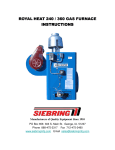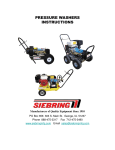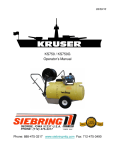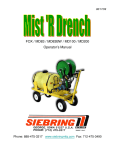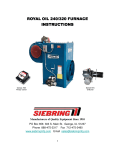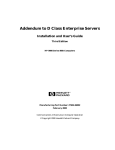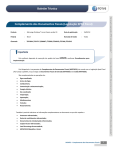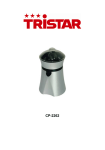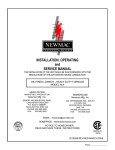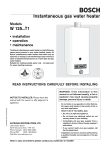Download Siebring ROYAL HEAT 240 Specifications
Transcript
ROYAL HEAT 240 / 360 GAS FURNACE INSTRUCTIONS ATTENTION! See special Methane instructions on page 2425 & H17 pilot insert in the back of this manual Manufacturers of Quality Equipment Since 1910 PO Box 658 303 S. Main St. George, IA. 51237 Phone 888-475-3317 Fax 712-475-3490 www.siebringmfg.com Email [email protected] TABLE OF CONTENTS: 1. Cover 2. Table of Contents 3. Condition of Sale - Warranty 4. Warnings & Cautions 5. General Information 6. General Information & Instructions 7. New Installations 8. Placement 9. Placement Options 10. Venting 11. Venting (continued) 12. Gas Supply Information 13. CO Level Standards 14. Gas Pipe Capacities 15. Pilot Adjustment 16. Square D electrical box 17. Electrical Diagram 18. Troubleshooting 19. Troubleshooting (continued) 20. Troubleshooting (continued) 21. Troubleshooting (continued) 22. Parts List 23. Parts Diagram – Furnace 24. Parts Diagram – Burner Tray 25. Special Requirements for Methane Furnaces 26. Special Instructions for Methane Furnaces 27. Specifications (dimensions, weight) 28. Specifications (continued) safety zone Included: Robertshaw Gas Valve Installation Pamphlet, Honeywell L4064 Fan & Limit Pamphlet, Honeywell Q327 Pilot Burners Pamphlet, H17 Pilot Valve. 2 CONDITION OF SALE SIEBRING MANUFACTURING, INC. GEORGE, IA 51237 Pursuant to Magnuson-Moss Warranty Federal Trade Commission Improvement Act P.L. 93-637, 88 STAT.2183-2193; U.P.C. 2301-2312 (Jan. 4, 1975), the following limited warranty will now replace all prior warranties issued by Siebring Manufacturing, Inc. We warrant the equipment manufactured by us to be free from defects in material and workmanship under normal use and service, our obligation under this warranty being limited to replacing at our factory any product, or parts thereof, which shall within one year after delivery thereof to the original purchaser be returned to us with transportation (UPS Ground) charges prepaid, and which our examination shall disclose to our satisfaction to have been thus defective. We neither assume nor authorize any other person to assume for us any other liability in connection with such equipment. “Overnight”, “Next Day” or any shipping method other than UPS Ground will be the responsibility of the customer. This warranty shall not apply to any equipment which shall have been repaired or altered outside of our factory in any way so as to affect its stability and reliability, nor which has been subject to misuse, negligence or accident, nor to any equipment, which shall have been operated beyond factory rated capacity. We shall not be liable for consequential damages caused by defective materials, equipment or parts warranted by their respective manufacturers. Any implied warranty (including the warranty of merchantability), to the extent permitted by law, is excluded. We will not grant any allowance for any repairs or alterations without written approval of an executive officer, and we reserve the right to make changes in design, or to make additions to, or improvements in, our products without imposing any obligations upon the company to install them on products previously manufactured. Siebring Manufacturing is not responsible for installation costs. 3 FOR YOUR SAFETY IF YOU SMELL GAS: 1. OPEN WINDOWS. 2. DON’T TOUCH ELECTRICAL SWITCHES. 3. EXTINGUISH ANY OPEN FLAMES. 4. DO NOT TRY TO LIGHT THE FURNACE 5. IMMEDIATELY CALL YOUR GAS SUPPLIER. WARNING: Improper installation, adjustment, alteration, service or maintenance can cause property damage, injury or death. Read the installation, operating and maintenance instructions thoroughly before installing or servicing this equipment. 4 GENERAL INFO: This unit complies with the American National Standard for Gas Unit Heaters (special units, which are not AGA certified, may also use this manual). 1. The installation must conform with all local codes, or, in the absence of local codes, it must follow the National Fuel Gas Code, ANSI Z223.1-1988. 2. All installation and servicing must be handled by qualified personnel. 3. This furnace should not be operated in an explosive or dusty environment. 4. This unit can be set up to run on Natural Gas or Liquid Propane (LP) gas. The orifices must be sized appropriately for each gas type and pressure. 5. The draft hood provided with each furnace must be installed vertically in the same air space as the furnace. This unit must be vented. 6. If this unit is used to heat an adjacent area, (not the same airspace as the furnace is in) an adequate air return area must be provided. 7. In greenhouses, this unit may be positioned on four (4) concrete block or bricks. 8. In garages, this unit should be suspended with at least 7’ of clearance under the furnace. In garages, install this unit in accordance with the Standard for Repair Garages ANSI / NFFA 88B and follow all local codes that apply. 9. In aircraft hangars, this unit should be suspended with at least 10’ of clearance from the wings or engine cowling, based on the highest aircraft normally stored in the hangar. Install this furnace in accordance with the Standard for Aircraft Hangars ANSI / NFPA 409. 10. Do not locate this unit closer than 12” to any combustible material, this includes the chimney, all four sides and top of the unit. The furnace may be set on any suitable non-combustible material. 11. Do not locate any items within 12” of the burner opening. This includes the combustion air supply and the blower inlets. Floor drafts can cause pilot outages. 12. If installed in parking structures, the Standard for Parking Structures ANSI / NFPA 88A should be followed. 5 24” The chimney height will be determined by the surrounding roof & trees. The chimney should extend at least 24” above the high point of the roof with no obstructions from nearby roofs, trees or other structures. THIMBLE Draft Cap The vent pipe should extend only to (and not beyond) the inside wall of the chimney. Cement vent pipe tightly into chimney opening. Trim or remove any nearby trees that would interfere with chimney draft DIRECTION OF FLOW MANUAL SHUTOFF VALVE DRAFT DIVERTER TEE UNION 12” EXTENSION (RH360) 3” MIN CONTROL MANIFOLD PIPE CAP Gas fired units will require less draft than coal fired, however, a chimney flue with adequate draft and capacity is required. An A.G.A. draft diverter must be installed on all gas-fired heating units. FLOOR LEVEL ⅛” N.P.T. PLUGGED TAPPING PRESSURE GAUGE PORT Location of union and drip leg for connecting conversion burner to house piping RH240 Requires 8” Ø Stack ROYAL Heaters RH360 Requires 9” Ø Stack RH360 Requires a 12” Extension between furnace and draft diverter 20 ft. General Information & Instructions 10 ft. -Unit crated weights: 240 = 640 lbs. / 360 = 780 lbs. -Always use double wall pipe on gas units. -Never have less than .02 - .04 inches of draft in the chimney. I I -Always use black metal piping for gas (Nat./L.P.) installations. -Rule of thumb for chimneys = 2’ vertical for every 1’ horizontal. 240 -Always check with the gas company on appropriate pipe sizing. -Always check with the gas company to ensure adequate fuel supply. -Never reduce the size of chimney from the furnace to the draft cap. -Never run exhaust fans in any building while furnaces are in operation. -Always vent gas fumes. Gas fumes not vented can cause death to plants, animals and humans. -The draft diverter must always be installed VERTICALLY unless otherwise stated by Siebring Mfg. Warranty will be void if venting does not meet local codes for gas venting. 6 360 NEW INSTALLATIONS Electrical Information Important! Before beginning any electrical work, be certain the electrical supply is disconnected. For the furnace to operate properly, it must be wired exactly as outlined in this manual. Connect to 120 VAC 60 HZ 25A Service An electrical diagram has been provided in this manual and on the face of the furnace. 1. If any wires as originally supplied are replaced, they should be replaced with type “T” wires, with a 63°F (35°C) rise wire in similar colors. 2. Follow all local codes when wiring this furnace. 3. This furnace must be electrically grounded in accordance with the National Electrical Code, ANSI / NFPA 70. WIRE SIZE RATING @ 140° 14-3 12-3 10-3 8-3 15 AMP 20 AMP 30 AMP 40 AMP LINE LOSS WITH 15AMP LOAD IN 100’ COPPER WIRE 8.0 VOLTS LOSS 5.5 VOLTS LOSS 3.0 VOLTS LOSS 1.9 VOLTS LOSS Wire Size for 115 & 230 Volt Single Phase Circuits Distance – Motor to Fuse or Motor to Meter Box MOTOR HP 100 FT. 200 FT. 300 FT. 500 FT. 115V 230V 115V 230V 115V 230V 115V 230V 1/4 # 14 # 14 # 10 # 12 #8 # 10 #6 #8 1/3 # 12 # 14 # 10 # 12 #6 # 10 #4 #8 1/2 # 10 # 12 #8 # 10 #6 #8 #4 #6 3/4 # 10 # 12 #6 # 10 #4 #8 #2 #6 1 #8 # 10 #6 #8 #4 #6 #4 1½ #4 # 10 #0 #8 #6 #4 2 #8 #6 #4 #2 3 #8 #6 #4 #2 5 #6 #4 #2 #0 7 PLACEMENT: This unit is designed to be used in various configurations. In greenhouses it may be positioned directly on the ground or suspended from the greenhouse structure. In aircraft hangars or garages, the unit will need to be suspended. 1. This unit may be suspended if necessary. Suitable framework, capable of handling the weight of the furnace, can be fabricated from angle, channel or tubing material. An eye bolt can be inserted in each corner or end of the angles, channels or beams to provide 4 corner support (4 req.). These bolts can then be installed thru a suitable ceiling joist etc. 2. Obviously, the structure must be strong enough to carry the additional weight of the furnace, snow load and any possible future modifications or additions. 240 RH – 650#, 360 RH – 780#. 2. In greenhouses, this unit is normally installed on four (4) bricks setting directly on the ground. A variety of openings can be supplied on these furnaces. 3. The furnaces require: A. 12” distance to any combustible material. (See General Info for exceptions) B. 12” of space for combustion air and blower supply air. C. Approximately 1 sq. ft. of inlet area per 150,000 BTU/hr input. In many cases, normal building cracks make up more than this area. D. Approximately 5 sq. ft. of return air area. The heated air must have a free path out of and back to the furnace. DO NOT restrict the discharge vents. E. A barometric device (supplied by the manufacturer) in the same room as the furnace. On the RH360 model, a 12” extension must be installed between the barometric device and the furnace to prevent back draft and to prevent flue gases from entering the blower inlet. F. Plenty of access space for servicing the blower motor, burner, etc. Access must also be provided to reach the gas valve and shut offs in case of an emergency. G. That all local codes are followed when installing the regulation flue pipes. 8 Placement Options End Broadcast & Fan Furnace Horizontal Airflow Fan Fan 6’ 40’ Inter – House Heating Note: - 24” sq. air returns (fan assist) on each end of the greenhouse - One heat unit for two houses is not recommended Heated Air Heated Air Under Bench Heating Air forced under bench through poly-tubing duct. Heated Air Air forced under bench. Bench covered with used poly. Heated Air Used Poly 9 VENTING Vent connectors serving Category I & Category II heaters shall not be connected into any portion of mechanical draft systems operating under positive pressure. This furnace is equipped with a blocked vent shut off system. DO NOT attempt to run this furnace until a qualified service man has checked the installation. INSTALLATION The installation must conform with local building codes or in the absence of local codes, the installation must conform with the National Fuel Code, ANSI Z223.1 Your furnace has been provided with a Draft Hood. This device must be used. This furnace also requires a blocked vent shut off device or spill switch (snap disc). The electrical schematic shows how this device is wired into the furnace controls. This device must be reset each time the sensor detects a venting failure. If the Blocked Vent switch has locked the system out, contact a qualified service man before attempting to restart the furnace. NOTE: Negative room pressures in buildings with exhaust fans will cause the blocked vent device to lock the gas valve out. (Heating will cease) GENERAL RULES 1. Do not reduce the stack size anywhere in the entire vent system.. 2. The stack must not be closer than 12” to any combustible material. 3. All horizontal runs must slope upwards not less than ¼” per foot from the heater towards the vertical riser or extension. 4. All horizontal runs must be supported to prevent sagging. The venting may be supported by steel strap or wires around the tube and tied up to any convenient overhead support. Supports must be provided at each connection. 5. Each connection should be secured by at least three sheet metal screws. More may be necessary depending upon installation. 6. The stack must be installed in such a manner to prevent accumulation of condensation. 7. If required, the stack must have a method of draining the condensation. 8. Use any type B flue or vent connectors. Unless local codes specify a superior type of flue or vent connectors. 9. Venting failures can be caused by adverse weather, exhaust fans being on at the same time as the furnace, inadequate make up air supply, lack of down-draft cap, etc. 10. Never allow less than 2’ vertical pipe for each 1’ of horizontal vent pipe. 11. Draft should never be less than .02” WC nor over .05” WC. 10 C E I J B F V A D H F I A. Draft Diverter B. Horizontal Flue (must slope up ¼” per foot) C. Vertical Flue (must be twice as tall as horizontal distance - B) D. Alternate stack design for free standing support E. Chimney should extend 2 – 4 feet above high point of roof F. A “Tee” instead of an elbow is recommended on the bottom of the vertical stack to facilitate water drainage and chimney cleaning. Install a cap on the bottom of the “Tee”. “V” – Vertical Chimney Height (must be at least twice as long as “H”) “H” – Horizontal Pipe (must slope upwards away from furnace, ¼” per foot of horizontal distance) “I” – Draft 0.02 to 0.04 inches of water column (measure below draft diverter) “J” – Install 12” to 24” riser between draft diverter and top of furnace. DO NOT OPERATE THIS UNIT WITHOUT VERTICAL FLUE PIPE! PROPER DRAFT MUST BE MAINTAINED TO PREVENT DANGEROUS GASES FROM ENTERING THE BUILDING…………………….. 11 GAS SUPPLY INFORMATION This furnace is designed to run on several gas types. Natural and LP are the most common. Each furnace is set up for one type of gas. DO NOT attempt to burn another type of gas without replacing proper burner and gas valve modifications. 1. An Individual shut off valve is required for each furnace before the gas regulator. 2. The heater and its individual shut off valve must be disconnected from the gas supply piping system during any pressure testing of that system at test pressure in excess of ½ PSIG (3.5kPa). 3. The heater must be isolated from the gas supply piping system by closing it’s own individual manual shut off valve during any pressure testing of the gas supply piping system at test pressures less than or equal to ½ PSIG (3.5kPa). 4. A 1/8” NPT, plugged tapping, accessible for test gauge connections, must be installed immediately upstream from the gas supply connection to the heater. 5. The combustion chamber may be cleaned with compressed air thru the stack opening and thru the fresh air inlet. (Remove the burner tray.) The burner manifold and nozzles may be brushed off and cleaned with compressed air. Any blocked nozzles may be opened by pushing a soft wire through the opening in the nozzle. DO NOT enlarge the nozzle orifices. 6. Type of Gas LP Nat. Max Inlet Supply (to valve) 14 6 Manifold 11 3½ Minimum Valve Inlet 11 4½ All pressures are measured in “Inches of Water Column” for manifold pressure. 7. To convert from one gas type to another A. Main Burner Orifices – LP (red colored Manifold) #63 drill size NAT (plain cast gray manifold) #52 drill size B. The orifice may be unscrewed and the correct orifices screwed back in. Pilot Orifice – LP (red colored) NAT (plain) C. The entire pilot assembly should be removed and the correct pilot installed. The pilot line should be aluminum. Gas Valve Regulator Spring – LP (red colored), NAT (plain). The large slotted screw on the top of the regulator should be removed to exchange regulator springs. After any of these changes are made, manifold gas pressure tests must be made. The gas valve must be adjusted correctly for proper furnace performance and operation. Water column manometers are preferred over dial type manometers. 12 13 14 Furnace Adjustments Pilot Adjustment The pilot flame should bathe the thermocouple in flame (1 ½” – 2”). Each gas valve has a pilot flame adjustment. Remove the screw beside the pilot gas line on the gas valve. The adjustment screw is down in this threaded hole. Turn counter-clockwise to increase flow. ⅜ TO ½ INCH Approx. 2” PILOT THERMOCOUPLE Pilot Burner Adjustment (on gas valve): 1. Remove Pilot adjustment cap. 2. 3. 4. Adjust pilot key to provide properly sized flame. 2” preferred. Clock-wise to decrease, counter clock-wise to increase Replace pilot adjustment cap. Leak test. To Light Pilot – Follow procedures on page 3, “Operating Instructions” of the “Robertshaw Installation Data” insert in the rear of the manual. Main Burner Adjustment The gas system should have its pressure tested. See Rating Plate for required pressures. See “Robertshaw Installation Data” in appendix for more information about these valves. The gas valve has an adjustable pressure regulator. The largest screw on the top of the gas valve must be removed to gain access to the adjustment screw. Turn clock-wise to increase the flow. Blower Belt Adjustment The blower belt must be loose enough that ½” to 1” of belt deflection can be obtained with a gentle push on the belt, mid-point between pulleys. Furnace power must be off while performing this check. Fan & Limit Adjustments Each fan and limit has three settings. Before making any adjustments, the rotating dial must be held in place with one finger or thumb while another finger on the other hand is used to change the setting, being careful not to damage or strain the sensing element. - Fan Stop 80°- 90° User Selectable - Fan Start 110°- 120° User Selectable - High Limit 170°- 180° 15 SQUARE D BREAKER BOX – RH360 Common Connect to 120 VAC 60 HZ 25A Service L1, Line In Ground Lug 25 Neutral To Blower Motor To Fan & Limit Switch To Transformer 16 Royal Heat – Gas 240 / 360 200°Snap Disc Connect to 120 VAC 60 HZ 25A Service CB Fan & Limit 180°Snap Disc To Blower Motor To Blue Bird switch To Terminal block To “Blue Bird” switch Transformer 120V to 24V To Thermostat Gas Valve Robert Shaw 700-406 17 TROUBLESHOOTING 1. Blower motor – heats up and trips out thermal protector on motor or the main breaker on power source. A. Belt tension too tight Loosen belt (1/2” – 1” deflection) B. Electrical supply wiring & distance exceeded Install correct wire gauge, usually larger C. Blower bearing will not turn freely Replace or oil bearings D. Bad motor (amp draw, shorted…) Take motor to authorized repair center or replace E. Higher amp draw due to lack of air restriction Replace or reinstall blower inlet guards (increase outlet restriction on furnace) 2. Blower motor – does not start A. Reset button or auto-reset device on motor Push in to reset (manual) Allow motor to cool, reset will be automatic B. Bad motor Take motor to authorized repair center or replace C. Fan & limit switch (defective) Check settings (factory 90°/ 110°/ 170°) or replace D. Loose wire or connection Tighten / secure as required 3. Blower shakes (vibrations) A. Belt tension/condition Correct tension or replace belt B. Pulley condition Check for split, worn or bent pulley C. Blower bearing Replace as required D. Blower wheel condition / dust build-up Replace or clean, check for missing balance weights 18 TROUBLESHOOTING (continued) 4. Unable to light pilot A. First time light attempt – air in gas line Purge air from gas line (test gas supply pressure) B. Blocked pilot orifice Clean or replace C. Check gas supply Gas line connected? Valve open? D. Pilot out of adjustment Open up needle valve (counter clock-wise to increase) E. Blocked or defective gas valve Replace gas valve 5. Pilot won’t stay lit after releasing gad cock dial, goes out immediately A. Inadequate pilot gas flow Clean orifice with compressed air / increase pilot gas flow (CCW) B. Bad thermocouple / corroded connection to gas valve Replace, clean, check/tighten connections on gas valve C. Bad gas valve Replace by qualified service person D. Downdraft through furnace Draft hood installed? Exhaust fan on? 6. Pilot won’t stay lit (intermittently) goes out at night… A. Inadequate pilot gas flow Clean pilot orifice / increase needle valve flow B. Weak thermocouple Replace C. Draft through furnace Is draft diverter installed? Exhaust fan on? Weak pilot gas flow 19 TROUBLESHOOTING (continued) 7. 8. 9. Main burner will not light – test gas pressure A. Thermostat not calling for heat Raise thermostat setting / replace thermostat B. Check preceding pilot tips Proceed as required C. Bad transformer Replace if 120V in, nothing out. 24V is correct D. Bad gas valve Replace by qualified technician Main burner lights weakly – test gas pressure, tank level A. L.P. – Inadequate gas tank temperature or evaporation area B. Tank valve undersized and freezing up. Increase valve size / capacity C. Supply piping too small Increase pipe size D. Wrong gas type Check gas type, replace orifices, pilot… E. Bad gas valve Replace by qualified technician F. Poor gas quality Connect to good gas supply G. Gas pressure too low to unit Increase line pressure H. Too many heaters on an inadequate supply line Re-engineer full “Heater On” gas demand Main burner lights harshly, delayed ignition A. Gas pressure too high Decrease gas pressure, see “Robertshaw Installation Data” B. Wrong gas type Check gas type, replace orifices, pilot… C. Bad gas valve Replace by qualified technician D. Pilot too small See pilot troubleshooting section E. Incorrect orifices Check correct orifice size, replace as required 20 TROUBLESHOOTING (continued) 10. Blower motor starts and stops frequently (while main burner is on) A. Improperly set fan & limit switch Set switch to proper temperatures (90°/ 110°/ 170°) B. Defective fan & limit switch Replace C. Furnace is not at full firing rate See main burner section 11. Discharge air too hot / too cold A. Check firing rate Check gas pressures, orifice size B. Improperly set fan & limit switch Set switch to proper temperatures (90°/ 110°/ 170°) C. Defective fan & limit Replace D. Blower belt slipping / blower speed is improper Correct belt tension / check motor or blower pulley size Special Note: Contact gas supplier to engineer gas unit demands and distribution systems 21 RH240 / RH360 Parts (When ordering parts, specify L.P, Natural gas or methane) 1. Draft Diverter 2. Snap Disc - 200° (Draft Diverter) 3. 12” X 9” Ø Pipe extension (RH360 only) 4. Breaker box 5. 25 Amp Breaker 6. Fan & Limit Switch 7. Snap Disc – 180° (Furnace Shell) 8. 24V Transformer 9. Terminal Block, low voltage 10. Blower Motor * (RH240 - ¾ HP, RH360 – 1 HP) DO NOT replace blower motor with farm duty or manual reset model. 11. Drive (motor) Pulley (RH240 – 4 ½”, RH360 – 3 ¾”) 12. Motor Mount Bracket (RH240 – Small, RH360 – Large) 13. Drive Belt (RH240 – 47”, RH360 – 49”) 14. Driven (blower) Pulley – 9” 15. Blower (RH240 – Small Lau, RH360 – Large Lau) 16. Belt Guard 17. Blower Guard (not shown) 18. Burner Tray (specify 240 or 360) 19. High Limit “Blue Bird” safety device 20. Orifice (L.P. # 63 / Nat. # 52) 21. Aluminum Tubing 22. Gas Valve 23. ¾” Street Elbow 24. ¾” X 12” Pipe Nipple 25. Tray Cover (360 only) 26. Manifold (specify 240 or 360) 27. Thermocouple 28. Pilot assembly (L.P.- Black fitting / Nat. – Silver fitting) 22 RH240 / RH360 Parts 1 10* 11 12 13 2 3 4 5 6 2 5 A 14 7 15 8 16 17 Not Shown 9 Parts may not be drawn to scale 18 23 20 19 18 21 25 22 23 24 26 Side View 27 28 Top View 27 Pilot & Thermocouple 21 24 28 Special Instructions – Methane RH240 / RH360 Methane Requirements: -A minimum of 3 PSI to a regulator rated at a minimum of 1,000,000 BTU located within 10’ of the furnace. -Gas must be regulated down to 13” of W.C. before the gas valve and 11.5” of W.C. after the gas valve. -The pressure and W.C. requirements must be met for each unit and checked while all units in the facility are in operation. -Use a minimum of 1” I.D. flex gas pipe or 1” I.D. gas rated flexible hose long enough to allow for burner tray removal (approximately 6 feet). This will facilitate lighting of the pilot and test burning of the nozzles. -Nozzle size will be determined by CO2 and BTU rating requirements. -Pilot can be L.P. or Natural gas and must be specified at the time of the order. -Standard methane nozzle is # 49. Anything different must be specified at the time of the order. -Gas must be lab tested for proper nozzle sizing. 25 Special Instructions – Methane RH240 / RH360 Lighting the pilot: 1. Turn wall thermostat to it’s lowest setting 2. Turn gas cock dial to “OFF” position 3. WARNING: Wait at least 5 minutes to allow any gas in the combustion chamber or burner area to vent. If you smell gas in the appliance area or near the floor, STOP and follow warning instructions on page 4 of this manual. Failure to do so may result in fire or explosion. 4. If you don’t smell gas, turn on the gas supply to the H17 pilot valve (smaller, L.P. valve). 5. Depress the reset button on the H17 pilot valve and hold. 6. Light pilot. Continue to depress reset button for 30 – 45 seconds or until pilot remains burning when the reset button is released. Lighting the main, methane burner: 7. With the L.P. pilot burning, turn the main valve gas cock dial to the “PILOT” position and press momentarily, then turn gas cock dial to “ON”. 8. The valve should now be configured for normal thermostat control. Gas Cock Dial Main Burner Methane L.P. Reset Button H17 Pilot Valve Pilot & dual thermocouple assembly 26 30 ½” Vent Flange 24” Ø Top View 3” 30 ½” Crated size: 62L x 43W x 64H 27 Blower Safety Screens 18 ½” 22 ½” Burner Tray 4” 51” 48 ¼” 18 ¾” 3” 22 ½” Blower Motor 24 ½” 57” Approximate shipping weight = 780 lbs. Burner Tray Side View Chimney 9” Ø Royal Heat 360 28 12” 12” 12” 6” 28” 34” Allow approximately 36” for tray removal. DO NOT locate this unit closer than 12” to any combustible material, this includes the chimney, blower, all 4 sides and the top of the unit. 12”





























